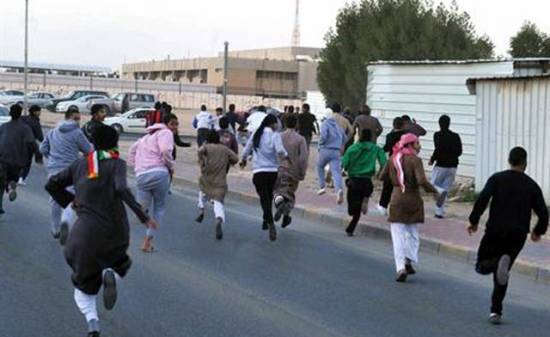Kuwait has decided to deport stateless people who took part in protests demanding citizenship, which turned violent, newspapers reported Tuesday.
The decision was taken at a meeting of the Central Agency for Illegal Residents, which deals with the stateless people known as Bidoons, chaired by Interior Minister Sheikh Ahmad al-Humud al-Sabah, al-Anbaa newspaper reported.
Other measures included dismissing all Bidoons from the army and the police force if they or their children attended the protests, and evicting them from housing provided by the government.
The government also decided to confiscate security IDs from any protester Bidoons, their only form of identification, and cancel their applications for Kuwaiti nationality.
Riot police used tear gas, water cannon and batons to disperse thousands of Bidoon protesters on Friday and Saturday, injuring scores and arresting more than 100 people, according to activists.
Kuwait says only 34,000 out of the 105,000 Bidoons present in the Gulf state are eligible for citizenship, while the remaining 71,000 are citizens of other countries who must produce their original passports.
About 43,000 of them are Iraqis, 16,400 Saudis, the rest are Syrians, Iranians, Jordanians, and other nationalities, according to official statistics published Tuesday by al-Watan daily.
The government promised that Bidoons who produce their original passports will be granted long-term residence permits, in addition to free public services and schooling.
It also decided to accelerate the process of granting Kuwaiti citizenship to those who deserve it, al-Anbaa newspaper reported.
Encouraged by the Arab Spring protests, Bidoons staged demonstrations in February and March last year. They renewed their protests in December to press authorities to resolve their decades-old plight.
Fifty-two Bidoons are on trial for protesting, while 32 others are still under investigation.
In a bid to force the Bidoons to produce their original nationality papers, Kuwait has refused to issue essential documents to most of them, including birth, marriage and death certificates, Human Rights Watch reported in June./agencies


